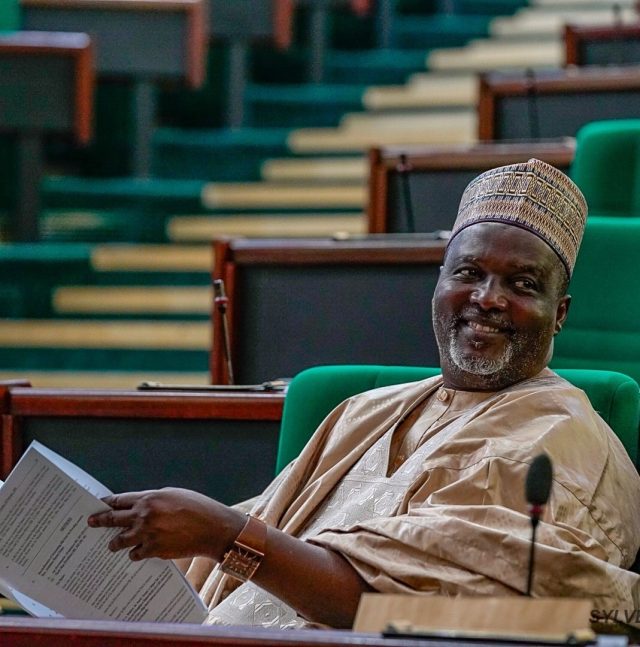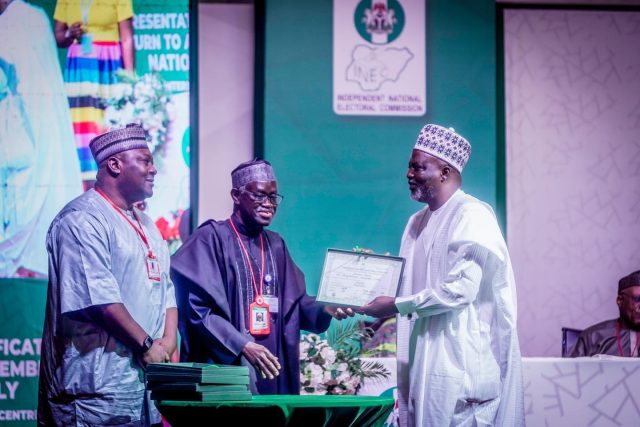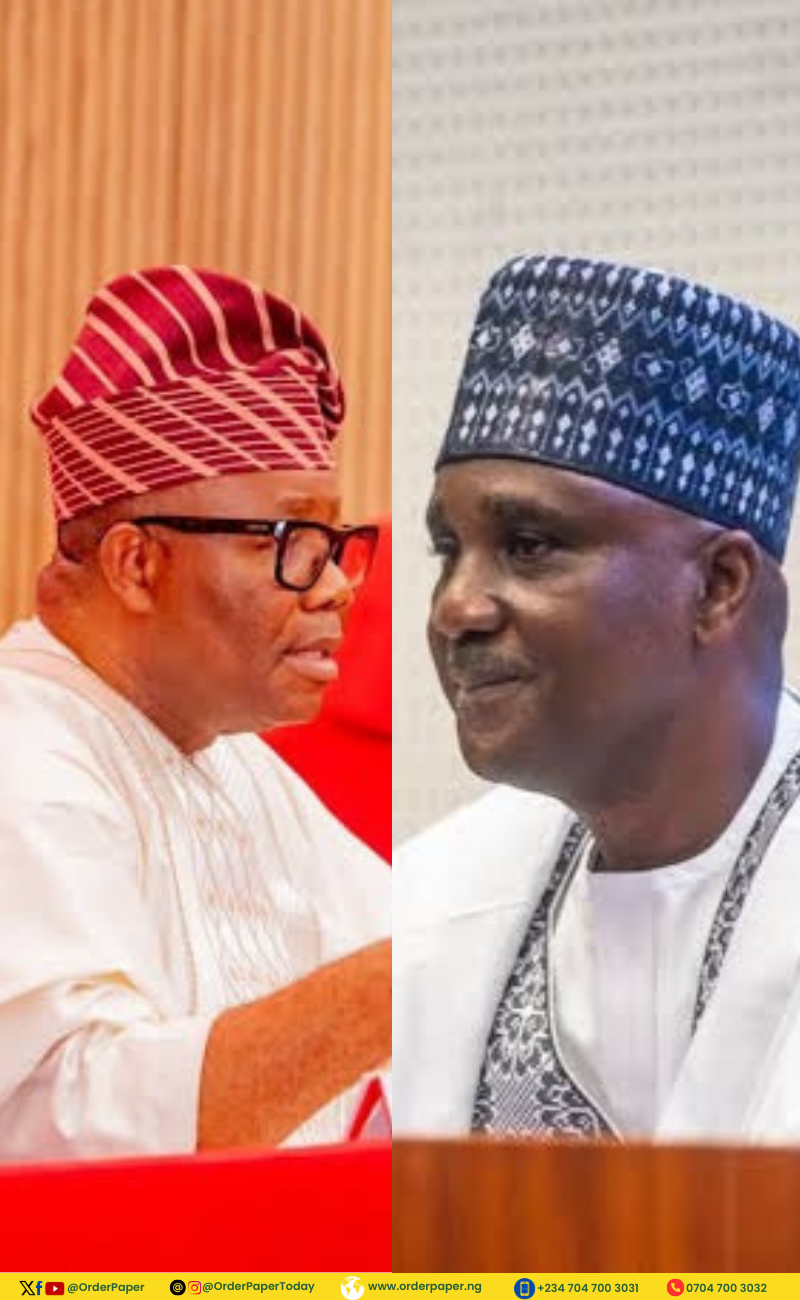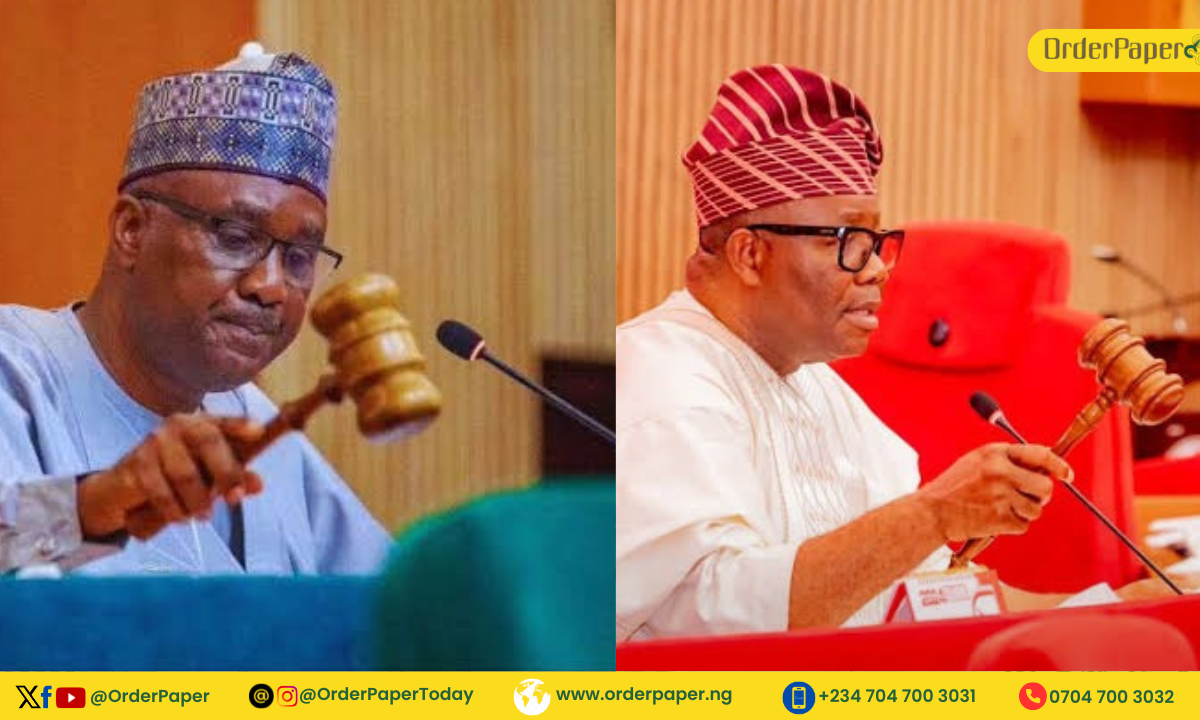Fifth-term lawmaker-elect Ahmed Idris Wase is not just ‘one of’ the eleven candidates eyeing the seat of Speaker in the Tenth House of Representatives.
He is the incumbent Deputy Speaker and, thus, a high-heeled political persona in the country. But will his ranking status and influence within the APC trump his controversial tenure as Deputy Speaker to become the number one legislator of the 10th House in June?
READ ALSO: 10TH NASS: What the early signals indicate in race for Speakership

Honourable Ahmed Idris Wase was first elected to the House of Representatives in 2007 under the defunct Action Congress of Nigeria (ACN) platform. Since then, he has been a consistent name on Nigeria’s federal lawmakers’ list in the last five electoral cycles.
He, however, remained obscure and largely lacked name and face recognition until he became a presiding officer in 2019. He was Chairman of the House Committee on Federal Character in the 7th and 8th Assemblies until his appointment in 2018 as Deputy Leader of the House of Representatives following the death of the then occupant, Buba Jubril. Not even his appointment into these positions was of much use in bringing him to national prominence, as he remained unknown beyond his close circle.
Following his success at the 2019 National Assembly elections, the Plateau lawmaker declared his intention to run for the seat of Speaker but was prevailed upon by his party to support Femi Gbajabiamila as Presiding Officer of the House. His loyalty was eventually rewarded as he emerged as Deputy Speaker of the Ninth House of Representatives and doubles as the House Committee Chairman on the Review of the 1999 Constitution.
READ ALSO: Reps Bagos, Mwadkwon, Gagdi, Deputy Speaker atop Plateau National Assembly Scorecard
STRENGTHS
Supporters of the parliamentarian argue that he should be given the nod to occupy the exalted office, considering his rise to the position of Presiding Officer in the Green Chamber. An argument they hinge on Wase’s decision in 2019 to step down for the incumbent speaker of the Ninth House in the interest of party supremacy. This favour is what they believe will be returned to the Plateau lawmaker come June.
Predictably, this argument appears to have landed him some notable endorsements from state governors like Abdullahi Sule of Nasarawa and Nyesom Wike of Rivers who are expected to influence the House of Representatives contingents from their states to back his ambition. How this will play to his advantage where the Rivers Governor would have been out of office by the inauguration day of the House or how Governor Sule will influence a bi-partisan Nasarawa delegation to the National Assembly remains to be seen.
Being the Deputy Speaker, Wase is empowered by the rules of the House to oversee the Constitution Review Committee in the Chamber. Thankfully thus, he is one of the major beneficiaries of sixteen successful amendments to the 1999 Constitution \by the Ninth National Assembly, which have since been assented to by President Muhammadu Buhari.
In the area of representation, the Deputy Speaker’s home state of Plateau and, indeed, Wase Federal Constituency has been bedevilled with insecurity. As a lawmaker, he has largely made contributions on the floor of the House and the Chamber under the leadership of Gbajabiamila, and himself held a Security Summit, which came up with very resounding positions on the sector.
Personally, he had in December 2021, while moving a motion of urgent public importance on recent attacks on Pinau in Wase Local Government Area of Plateau State, accused some officers of the Nigeria Police Force (NPF) of conniving with bandits operating in the North to cause havoc in his State. Leading debate on the motion, he particularly cited three instances where police officers released suspected bandits, kidnappers and robbers, stressing that some security agencies are conniving with bandits to sabotage the effort of the government to tackle bandits.
On one occasion, speaking with journalists in Plateau, he also posited that the rising insecurity bedevilling his home Local Government Area is connected to the mining activities and the influx of bandits from Zamfara, Kaduna and other states experiencing similar criminal activities in the country.
In measuring his competence and capacity using the core duty of lawmaking as representative for Wase Federal Constituency, Maje, as his admirers fondly call him, sponsored seventeen (17) bills in the first three years of the Ninth Assembly (2019 – 2022). Only three of these bills have however been passed by the House and sent to the Senate for concurrence, namely: Federal University Gashua (Establishment) Bill, 2019, Federal Medical Centre, Wase (Establishment, Etc.) and the Orthopaedic Hospitals Management Board Act (Amendment) Bill, 2020.
Three of the remaining fourteen bills; Federal College of Medical Laboratory Science, Jos (Establishment, Etc.) Bill 2021, Currency Conversion (Freezing Orders) Act (Amendment) Bill, 2019, and the National Social Investment Programmes (Establishment) Bill, 2020 have been laid on the table and awaiting report respectively. The other eleven pieces of legislation listed below are awaiting Second Reading, including:
-
- Federal Character Commission Act (Amendment) Bill,2019
- Public Accounts Implementation Tribunal (Amendment) Bill, 2019
- Federal Commissions (Privileges and Immunities) Act (Amendment) Bill, 2019
- Miscellaneous Offences Act (Repeal) Bill, 2019
- National Housing Fund (Establishment) Bill, 2019
- Nigeria Football Federation Bill, 2019
- National Sports Commission Bill, 2019
- Federal Mortgage Bank of Nigeria (Establishment) Bill, 2019
- National Institute for Sports Act (Amendment) Bill, 2019
- Orthopedic Hospitals Management Board Act (Amendment) Bill, 2021
Importantly, in the Performance Scorecard of eleven federal lawmakers from Plateau State, comprising three (3) Senators and eight (8) House of Representatives, he ranks fifth on the bills chart (based on volume) behind Rep. Dachung Musa Bagos (33 bills), Simon Davou Mwadkwon (23 bills), Yusuf Adamu Gagdi (21 bills) and Istifanus Dung Gyang (18 bills). With 17 bills standing in his name, Wase ranks top on the list of Presiding/Principal Officers from the North Central geo-political zone.
Wase’s strongest claim to the Speakership slot, however, appears to be the canvassing for zoning of political offices by the governing party, the All Progressives Congress (APC). Specifically, members of the party from his North Central geo-political zone are clamouring for the seat of Speaker on the ground that the zone made one of the highest vote contributions during the presidential contest.
If the proponents of this school of thought eventually have their way, there are indications that he is likely to win the party leadership’s heart, being the most ranking member and given his experience as First Deputy Speaker of the Economic Community of West African States (ECOWAS) Parliament.
READ ALSO: North Central Senators sponsored 21% of total Senate bills | National Assembly Scorecard

WEAKNESSES
According to Order 7, Rule 2(2) of the House, “the Deputy Speaker shall be the Chairman of Committee of the Whole House, save when the House goes into the Committee of Supply or Ways and Means.”
The highly controversial Deputy Speaker is often in the spotlight during the performance of this statutory function as Chairman of the House Committee of the Whole, which is mandatory for passing bills and petitions. In this light, he has consistently shown a low tolerance for dissenting voices.
Known also for his uncompromising loyalty to the Executive, he is able to deliver passage of bills sent in by the Executive or those in which the House leadership has an interest in while denying the minority their say in the process. These controversial actions were most evident during the process leading up to the passage of the Petroleum Industry Bill (PIB), as well as the Electoral Act (Amendment) Bill 2022, where his disregard for dissenting voices led to fists fights, four rowdy sessions and a walkout by some members of the opposition.
At the peak of the EndSARS protests which had rocked the country, Rep. Shina Peller, on October 20 2020, in an attempt to raise a point of order to discuss the developments, was blatantly shut down by the Deputy Speaker who was the presiding officer at the plenary session. Speaking to the Oyo lawmaker, Rep. Wase was quoted to have said: “I will not allow you to speak.”
Peller, who represents Iseyin/Itesiwaju/Iwajowa/Kajola Federal Constituency of Oyo State, was at this point infuriated and then charged towards the Speaker’s box, threatening that he would speak with the media on the matter before he was held back by some lawmakers.
Interestingly, in July 2021, when the report of the Joint Committees that investigated the federal government’s suspension of operations of Twitter in Nigeria, the Deputy Speaker, who was the Presiding Officer over the House Committee of the Whole, vehemently opposed the report on flimsy grounds.
He initially opposed the report because the Committee on National Security and Intelligence Chairman, Sha’aban Sharada (APC, Kano), was not involved in the investigation and proceeded to ask that the report be stepped down because members of the Committee did not sign after a first glance. Not even explanations by the Chairman of the Joint Committee, Rep. Segun Odebunmi (APC, Oyo) that all the Committees signed the original copy could stop the back and forth.
The Committee’s saving grace was Speaker Gbajabiamila, who then intervened for the report to be considered, though he was on the floor as a member.
Another unforgettable controversy came in early 2021 when the Deputy Speaker shut down a petition by Rep. Mark Terseer Gbillah on behalf of the Mutual Union of Tivs in America (MUTA) over killings by suspected Fulani herders in Benue State. A development that eventually became a huge subject of controversy as he ignored all arguments and ruled that an association in America cannot present a petition in Nigeria under the guise that those presenting the petition probably have dual citizenship.
“If they are in America, could they be an interested party here? Do they really know what is really going on? “I don’t want to make a blanket statement regarding those who are in the Diaspora. If this petition is coming from those within the country, I believe it has a block standard. But those living in America, then coming to lodge complaint?” Wase said.
A reminder of the fact that such petitions from Nigerians in the diaspora had been heard by the House in the past could not also convince the Deputy Speaker, who was hell-bent on the matter. Following protests by Nigerians in the Diaspora, the petition was eventually laid before the House when Gbajabiamila presided over plenary.
Unlike Speaker Gbajabiamila, who likes to indulge members in having their say, the Deputy Speaker is reputed to be intolerant to long debates. He prefers that matters be referred to relevant Committees rather than have members debate on the floor of the House. Latching on to the excuse of guiding the House, the Plateau lawmaker has further built a reputation of always involving himself in debates in attempts to sway the lawmakers or foist a position on the House.
READ ALSO: 10TH NASS: Reps Minority Caucus working to produce House Leadership
ROAD TO 10TH NASS SPOTLIGHT
| AHMED IDRIS WASE Muslim, 58 |
|
| Geo-political Zone | From North-central, one of the zones laying a claim based on geopolitical balancing |
| Political/Parliamentary Experience | Deputy Leader, 8th House of Reps (2018 – 2019) |
| Deputy Speaker, 9th House of Reps (2019 – 2023) | |
| 1st Deputy Speaker, ECOWAS Parliament
Chairman, House Committee on Federal Character (7th & 8th Assemblies) |
|
| Legislative Achievements: Bill Tally/Value/Progression | 17 Bills sponsored in three years | None Assented Three Passed by the House, Two Awaiting Report, One Laid on the Table, Eleven awaiting Second Reading |
| Strengths | Loyalty to the party & presidency |
| Likely to benefit from zoning clamour | |
| Ranking parliamentary experience | |
| Weaknesses | Believed to be intolerant of opposing views |
| Controversial ruling while presiding at plenary | |
| No notable personal legislative contribution in spite of being ranking MP | |
In all, the race is not likely to be a walkover for Rep Wase and might be a hard nut for the former House Deputy Leader to crack. Considering especially the earlier highlighted controversies around his leadership of the Chamber and the belief that the Tenth House would want to shrug off any perception of being a ‘rubber stamp’ Assembly in the light of what the executive-legislative relationship under the Ninth House under Gabajabiamila and Wase was like.
Quite importantly also, the possibility of opposition parties in the Tenth House clinching the seats of Speaker and Deputy Speaker, given their numbers reported to be sufficient to produce the leadership of the Chamber, is another hurdle that Wase will need to climb. Although, the election management body is yet to release the official number of seats won by each of the eight parties that secured a place in the Tenth House.
Indeed, regardless of the permutations, the 360 Members-elect in the Tenth House will decide the fate of Rep. Ahmed Idris Wase upon the inauguration of the Assembly in June.



